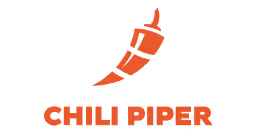Openlead Alternatives
Find an Openlead alternative. This guide compares 10 platforms on features, pricing, and use cases to help you make an informed decision.

You might be using Openlead for its lead generation tools. It is a solid choice for many, and it performs well in specific areas. Perhaps you have found it useful for building initial prospect lists or managing early-stage outreach. It gets the job done for certain tasks.
However, like any tool, it has limitations. Some users find certain features lacking or wish for more customization. This can lead you to look for an alternative. We've analyzed the best Openlead alternatives, comparing their pros and cons based on G2 reviews, to help you choose. Let's get started.
Consider 11x for Your Sales Efforts
For those interested in adding digital workers to their sales process, 11x is a relevant option. The platform provides autonomous agents to handle various sales tasks, which could be a fit if you want to automate parts of your workflow.
11x is a GTM platform that uses AI agents to manage the sales process. Its agent, Alice, identifies prospects, conducts outreach via email and LinkedIn, and maintains CRM data.
Another agent, Julian, handles inbound lead qualification and schedules meetings. The platform consolidates data enrichment, outreach, and email warmup, removing the need for multiple separate tools.
Openlead Alternatives
The following section provides a detailed review of Openlead alternatives. Each review covers pricing, key features, and specific advantages and disadvantages to inform your decision.
1) Apollo
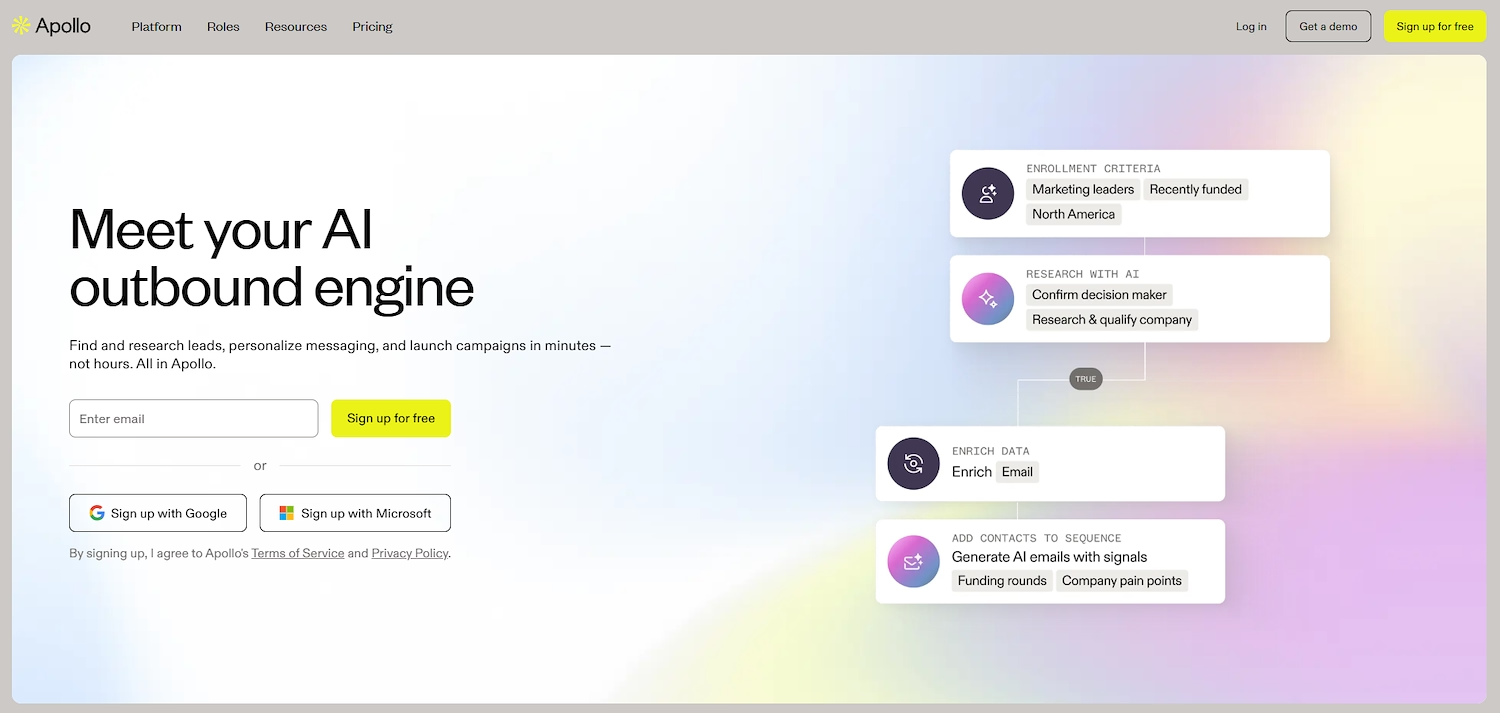
Apollo is a sales intelligence platform with a large B2B contact database. It helps sales teams find prospects and build lead lists with specific filters.
The platform also includes tools for outreach automation to connect with potential customers. It combines data and workflow functions in one place for sales professionals.
Apollo's Main Features
- The platform provides access to a large B2B contact database for prospecting.
- Users can build targeted lead lists by applying specific filters to the contact database.
- It includes outreach automation tools to engage with potential customers.
- The system integrates data and workflow functions into a single platform for sales professionals.
How Apollo Compares to Openlead
Average Review Score: 4.7/5 stars based on 8,904 G2 reviews.
- Apollo offers access to a B2B database with over 210 million contacts, a larger pool for prospecting than what Openlead typically provides.
- It combines sales intelligence, engagement, and analytics into a single platform, whereas Openlead often focuses on more specific parts of the sales process.
- The platform includes a full engagement suite for creating and scaling outreach sequences, offering more advanced automation compared to Openlead's early-stage outreach management.
- Unlike Openlead, this tool has an intelligence engine that gives recommendations and analytics to help teams refine their sales approach.
- Apollo provides built-in lead validation and enrichment features to ensure data accuracy, which can reduce the need for external data cleaning tools.
Potential Drawbacks of Apollo vs. Openlead
- Apollo sometimes has a steeper learning curve due to its many features. In comparison, Openlead provides a more direct user experience that can be easier for teams to adopt for initial tasks.
- The tool's vast database occasionally contains outdated contact information. This might require users to spend extra time on data verification, a step that can be less frequent with Openlead.
- Its all-in-one platform can be too complex for teams that only need basic lead generation. Openlead's focus on early-stage outreach makes it a more streamlined choice for these specific needs.
Pricing and Cost-Effectiveness
Apollo provides several pricing tiers, including a free plan, a Basic plan at $49 per user per month, and a Professional plan at $79. Since Openlead does not publish its pricing, a direct cost comparison is unavailable, but Apollo's tiered model offers clear scalability.
2) ZoomInfo SalesOS
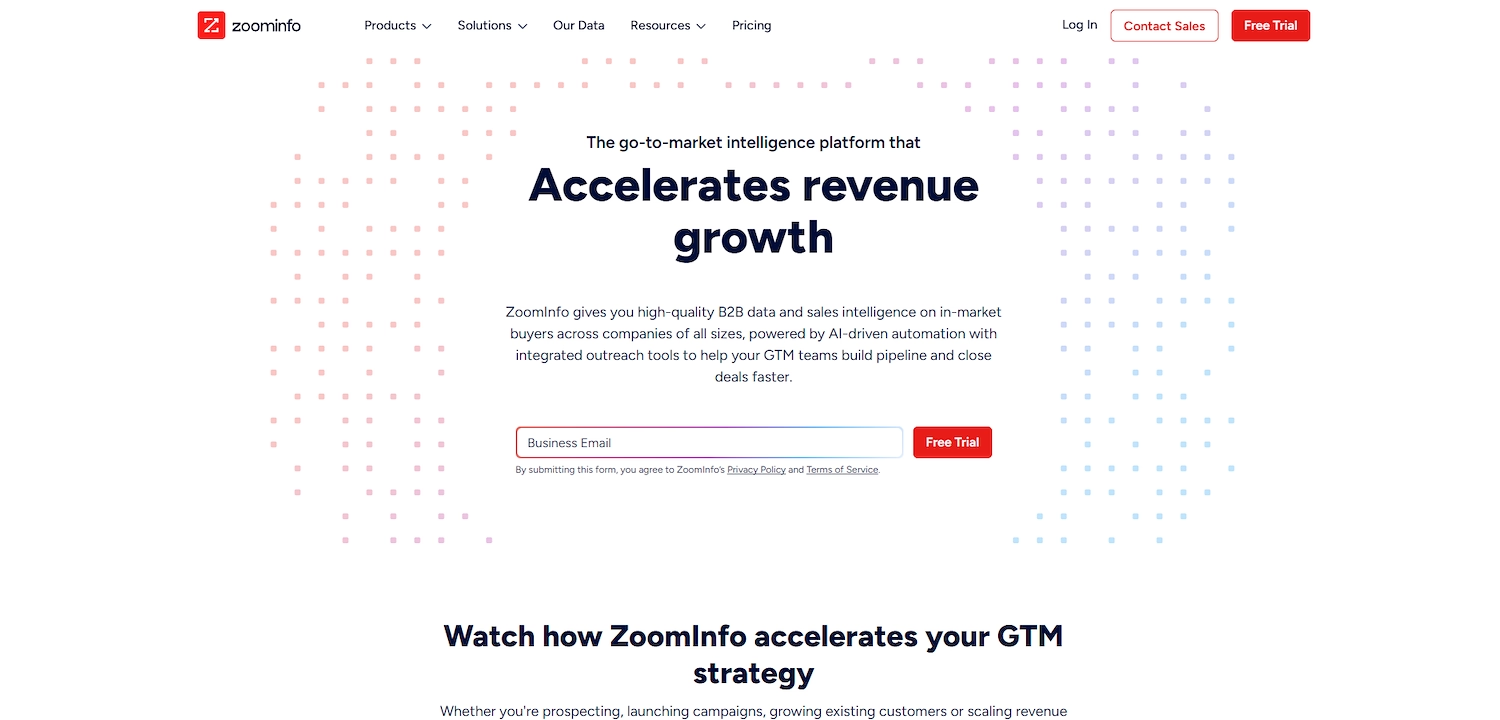
ZoomInfo SalesOS is a go-to-market intelligence platform for B2B organizations. It helps teams identify and connect with buyers through a system that unifies company data, contact details, and buyer-intent signals.
Revenue teams can use the platform to build prioritized lead lists, find accounts that are ready to buy, and launch campaigns.
ZoomInfo SalesOS's Main Features
- The platform provides conversation intelligence to analyze interactions from every call and meeting.
- It offers website visitor tracking to identify anonymous page views and turn them into potential sales leads.
- The system uses predictive modeling to find potential customers that match an ideal customer profile.
- A generative AI companion, ZoomInfo Copilot, surfaces insights and drafts outreach communications.
How ZoomInfo SalesOS Compares to Openlead
Average Review Score: 4.5/5 stars based on 8,738 G2 reviews.
- ZoomInfo SalesOS provides buyer intent data to identify accounts ready to buy. This is a more advanced feature compared to Openlead's focus on initial list building.
- It includes a generative AI companion, Copilot, that offers guided recommendations. Openlead, in contrast, provides tools for more manual outreach management.
- The platform offers conversation intelligence to analyze calls and meetings for insights. This provides deeper post-interaction analysis than the outreach tools found in Openlead.
- This tool can track anonymous website visitors and turn them into leads. This capability differs from Openlead, which primarily works with predefined prospect lists.
Where Openlead Might Be a Better Fit
- The platform's pricing can be high, which may not fit the budget of smaller teams. In comparison, Openlead often presents a more accessible entry point for basic lead generation needs.
- Some users report that the implementation process can be lengthy. Openlead, with its more focused feature set, typically allows for a quicker setup and faster team adoption.
- While its database is extensive, some contact information might be outdated. This can require manual verification, a step that may be less frequent with Openlead's potentially more curated lists.
- For teams that only need to manage early-stage outreach, the tool's comprehensive features can feel excessive. Openlead provides a more streamlined experience focused on initial prospecting.
Pricing and Cost-Effectiveness
ZoomInfo SalesOS does not publish its pricing and operates on a custom quote basis, which is typical for enterprise-focused platforms. Since Openlead's pricing is also not public, a direct cost comparison is not possible. For an accurate quote, we recommend visiting the ZoomInfo SalesOS's official website.
3) Lusha
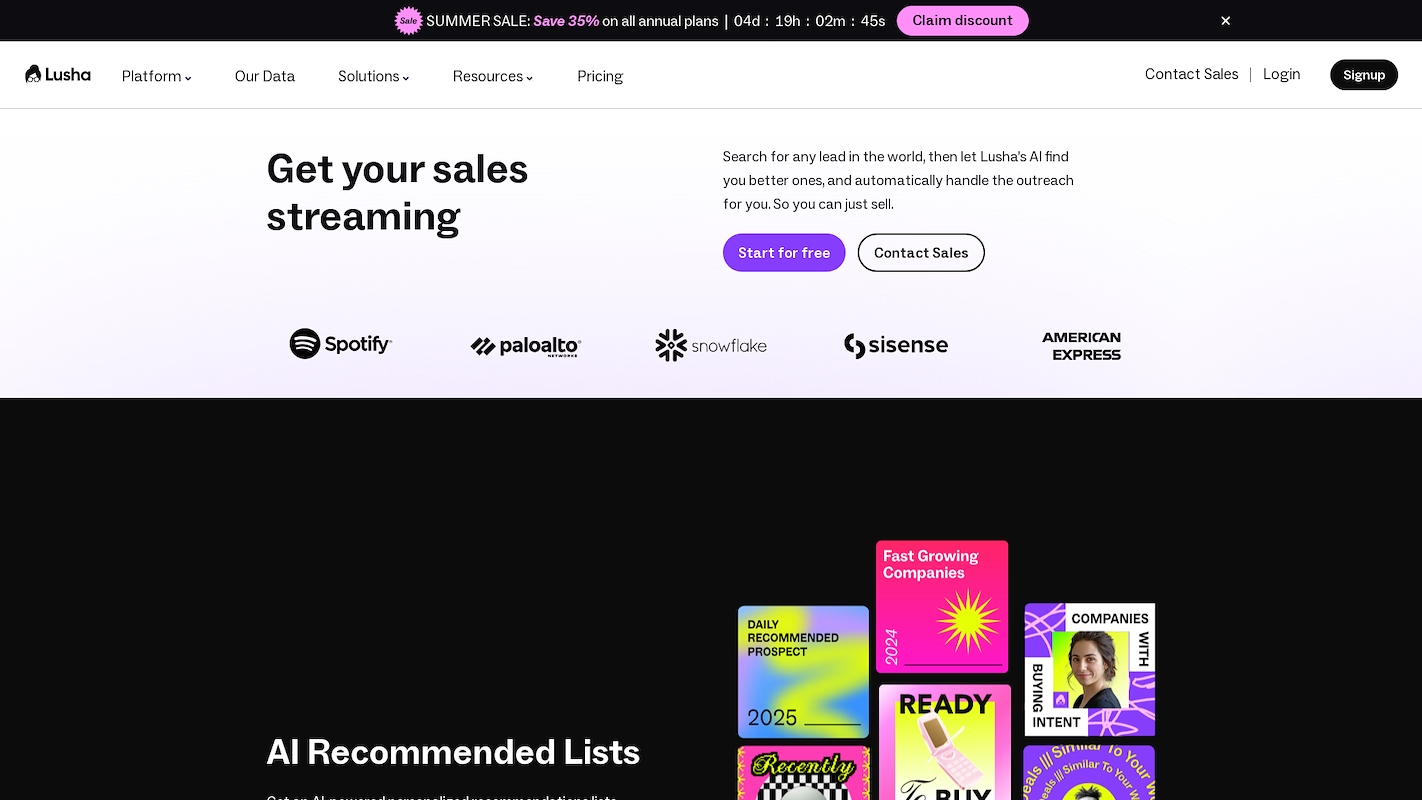
Lusha is a sales intelligence platform that helps revenue teams find B2B leads. It uses AI for prospect recommendations and to automate outreach across channels in one workflow. The platform provides global data and integrates with many CRMs.
Users build prospect lists and get a continuous supply of new leads that match their ideal customer profile. It also prioritizes outreach with buyer intent signals.
Lusha's Main Features
- The platform provides AI-recommended lists of companies and decision-makers based on a user's ideal customer profile.
- It creates live, auto-updating prospect playlists that add new leads at user-defined intervals.
- Users can search for contacts and companies with advanced filters, including buyer intent and funding rounds.
- The system records and analyzes sales meetings to provide post-interaction insights.
How Lusha Compares To Openlead
Average Review Score: 4.3/5 stars based on 1,516 G2 reviews.
- Lusha provides AI-powered prospect playlists that automatically update with new leads, which differs from the more manual initial list-building process in Openlead.
- It uses buyer intent data to help teams prioritize outreach to accounts that show buying signals, an approach not central to Openlead's early-stage outreach management.
- The platform offers advanced search filters, such as company funding rounds, for more targeted prospecting than the general list-building tools in Openlead.
- This tool can record and analyze sales meetings to find insights after an interaction, while Openlead focuses more on pre-sales and initial outreach tasks.
Where Openlead Might Be a Better Fit
- Lusha's pricing can be high for smaller teams, and some users find its credit system restrictive. Openlead might be a more cost-effective choice for teams that only need basic lead generation tools.
- Some users say Lusha's database occasionally contains outdated contact information. This can lead to extra time spent on verification, a step that might be less frequent with Openlead's focus on initial list building.
- The tool's advanced features, like AI playlists, can be too much for teams with simple needs. Openlead provides a more direct user experience for early-stage outreach, which can be easier for some teams to adopt.
Pricing and Cost-Effectiveness
Lusha offers a free plan, a Pro plan at $36 per user per month, and a Premium plan at $59. Since Openlead does not publish its pricing, a direct cost comparison is unavailable. Check the detailed pricing of Lusha on Lusha's official website.
4) Cognism
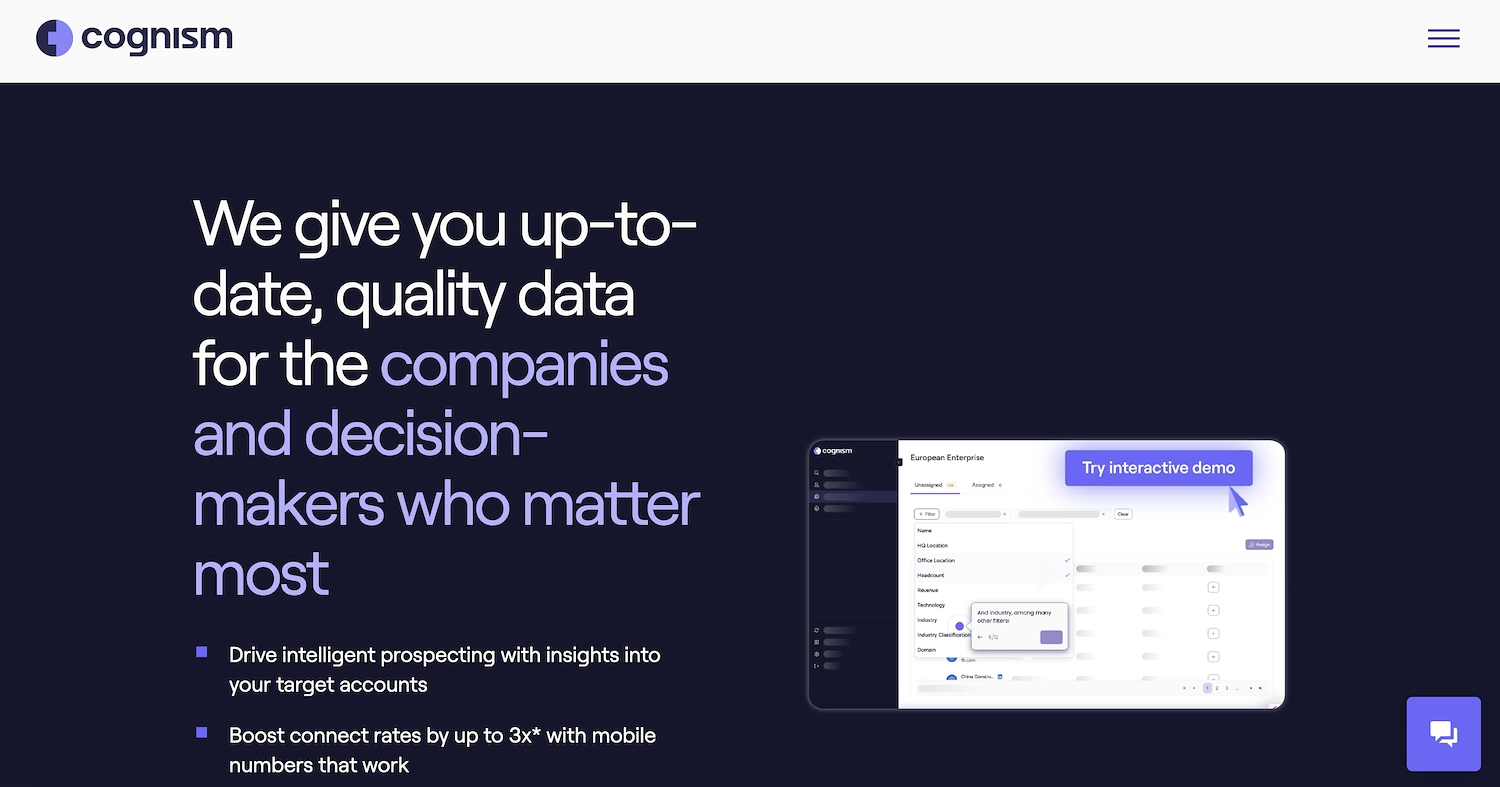
Cognism is a sales intelligence platform that offers B2B contact and company data. Revenue teams use it to find prospects and build lists for outreach. The service provides information to support go-to-market plans and helps sales professionals connect with decision-makers within specific companies.
Cognism's Main Features
- The platform provides phone-verified, human-checked mobile numbers, known as Diamond Data®, to increase connect rates.
- It offers extensive coverage of mobile numbers and email addresses for contacts specifically within the UK and EMEA regions.
- The system uses signal data, such as hiring trends and funding rounds, to surface timely buying signals for outreach.
- It includes a database focused on senior-level decision-makers, which is screened against Do-Not-Call lists for compliant outreach.
How Cognism Compares to Openlead
Average Review Score: 4.6/5 stars based on 1,033 G2 reviews.
- Cognism provides phone-verified mobile numbers, which increases connect rates compared to the more general prospect lists found in Openlead.
- The tool offers strong data coverage for UK and EMEA markets, providing a more targeted resource for regional outreach than Openlead's general list-building capabilities.
- It uses intent data, like company hiring trends, to identify timely sales opportunities, a more advanced feature than Openlead's tools for initial prospect list creation.
- Cognism's contact database is screened against Do-Not-Call lists to support compliant outreach, a feature not specified in Openlead's outreach management.
Where Openlead Might Be a Better Fit
- Cognism's pricing structure can be a significant investment for smaller teams. Openlead, in contrast, often provides a more budget-friendly entry point for basic lead generation needs.
- Some users report that the platform has a learning curve to use its advanced features. Openlead's more focused toolset can offer a simpler user experience for teams that need to get started quickly.
- While its database is large, some contact details might be outdated. This sometimes requires manual verification, a step that can be less frequent with Openlead's potentially more focused prospect lists.
Pricing and Cost-Effectiveness
Neither Cognism nor Openlead publishes its pricing, which makes a direct cost comparison unavailable. For an accurate quote based on your needs, we recommend visiting Cognism's official website.
5) Seamless.AI
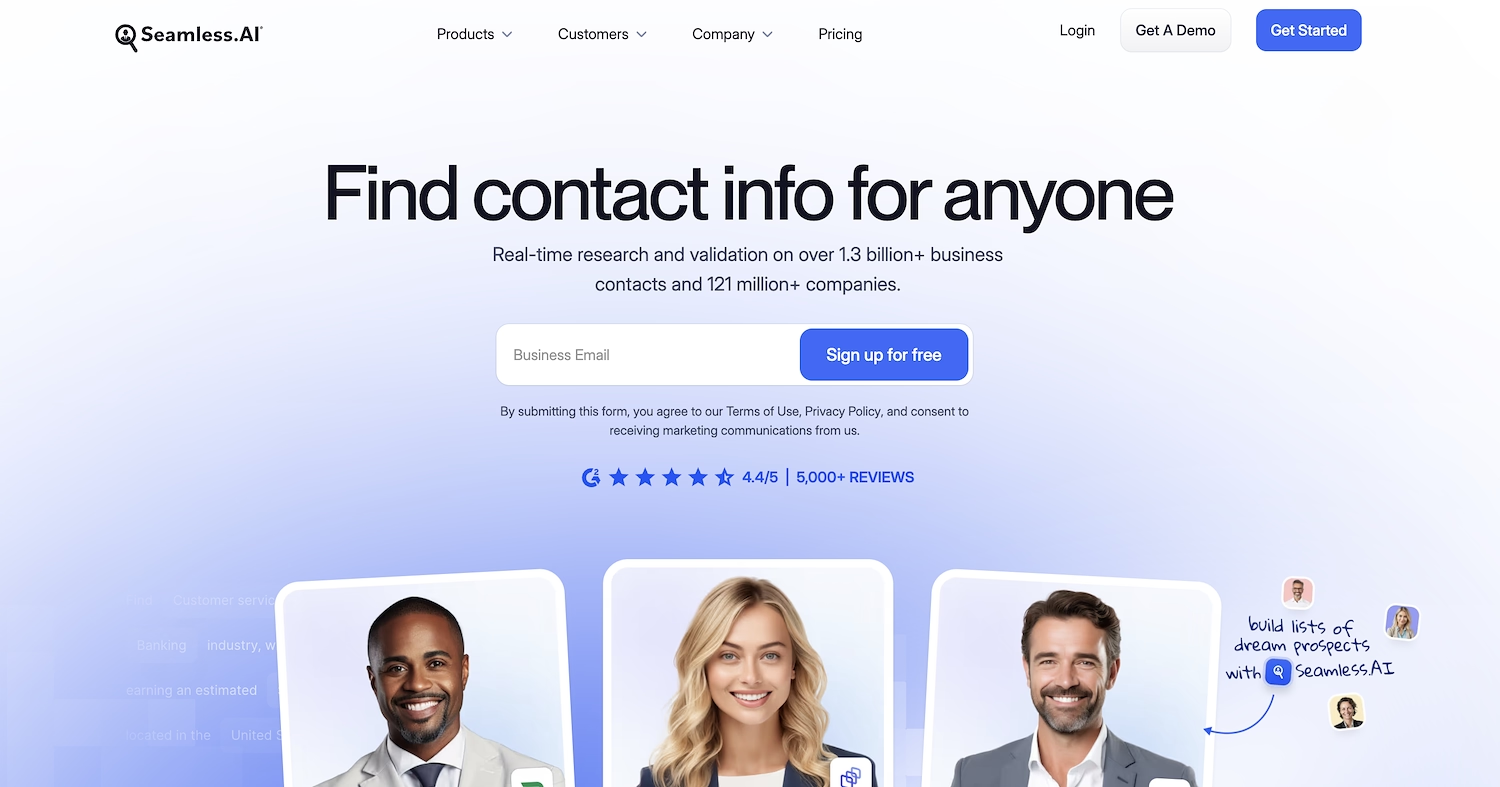
Seamless.AI is a sales intelligence platform with a real-time search engine. Sales professionals use it to find contact information, such as verified emails and direct phone numbers, for their target accounts. The platform helps build lists for outreach campaigns.
Teams use the tool to connect with decision-makers and populate their CRM with accurate data. It serves sales development, marketing, and recruiting professionals who need to identify and engage with specific contacts for their initiatives.
Seamless.AI's Main Features
- Uses a real-time search engine to find and verify contact and company information on demand.
- Provides buyer intent data to surface prospects who are showing signs of being ready to purchase.
- Monitors job changes for customers and prospects, automatically delivering updated contact information.
- Includes an Autopilot feature that automates list-building to maintain a consistently full pipeline.
How Seamless.AI Compares to Openlead
Average Review Score: 4.4/5 stars based on 5,067 G2 reviews.
- Seamless.AI uses a real-time search engine to find contact information on demand. This provides more current data compared to Openlead's tools for building static prospect lists.
- It offers buyer intent data to find prospects ready to buy. This differs from Openlead's focus on building broader, initial prospect lists.
- The tool monitors job changes and automatically updates contact information. This helps maintain data accuracy over time, a feature not specified for Openlead's list management.
- Its Autopilot feature automates list building, which can save time compared to the more manual list creation process in Openlead.
Where Openlead Might Be a Better Fit
- The platform's advanced features, like buyer intent data, can be excessive for teams that only need basic list-building. Openlead provides a more focused toolset for early-stage outreach, which can be simpler for teams to adopt.
- Some users report that the real-time search occasionally provides outdated contact details. This might require manual verification, a step that can be less common with Openlead's more focused approach to list building.
- Its credit-based system can be a limitation for teams with high-volume prospecting needs. Openlead often serves as a more accessible option for basic lead generation, which may better suit teams with smaller budgets.
Pricing and Cost-Effectiveness
Since neither Seamless.AI nor Openlead publishes its pricing, a direct cost comparison is unavailable. For the most accurate and up-to-date pricing information, we recommend visiting Seamless.AI's official website.
Explore 11x for Sales Automation
For teams looking to add digital workers to their sales process, 11x is a relevant option. The platform provides autonomous agents to handle various sales tasks, from prospecting to CRM updates. If automating your workflow is a priority, consider exploring what 11x can do for you.
With 11x, AI manages the sales process. Alice finds prospects, enriches data, and drives outreach. Julian qualifies leads and schedules meetings. The platform consolidates everything from data enrichment to email warmup, replacing multiple tools in a GTM stack.
Book a demo to see it in action.
6) LeadIQ
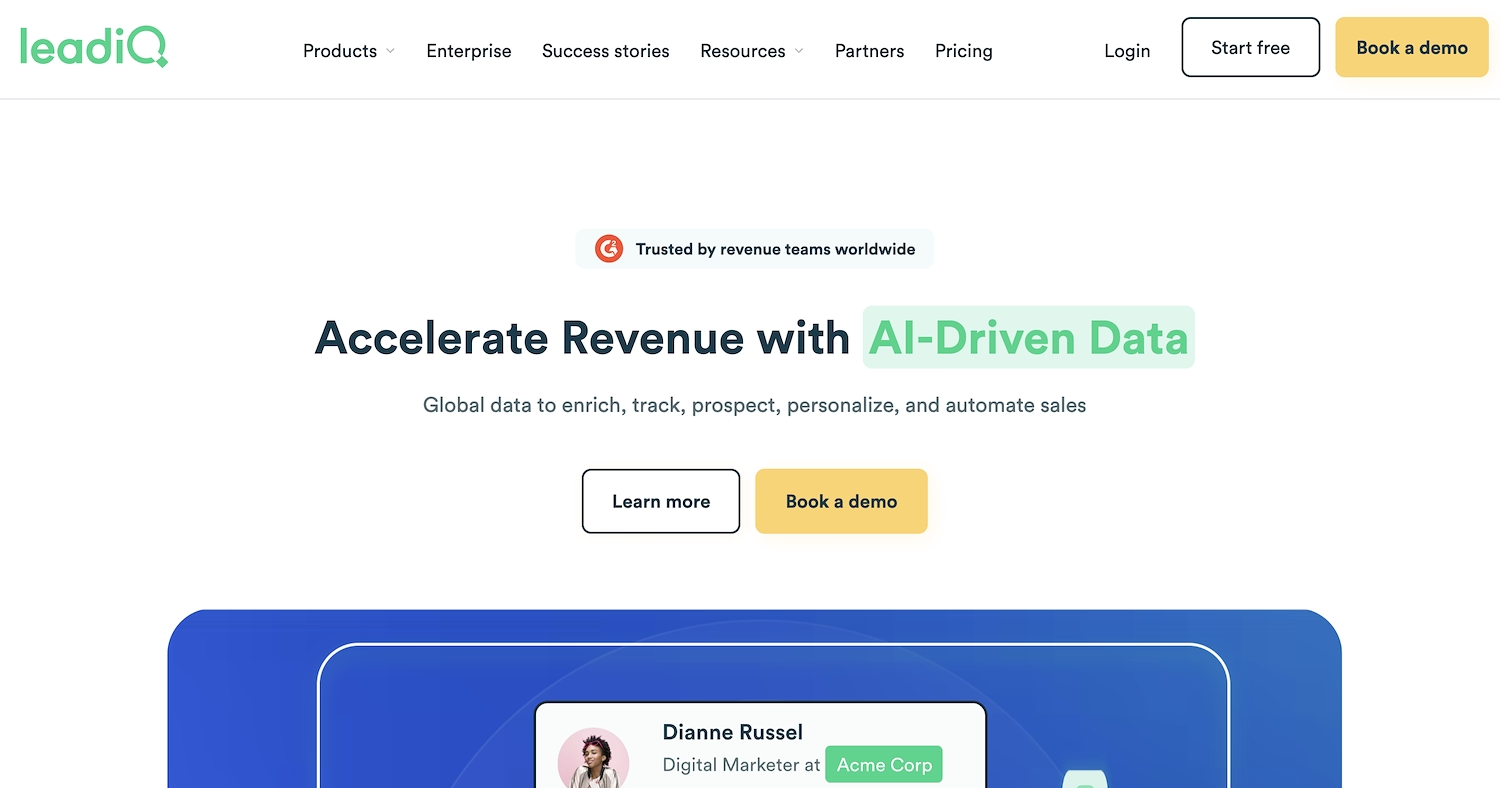
LeadIQ is a prospecting platform for sales teams. It helps users find, capture, and sync contact data directly to their sales tools. The platform provides verified emails and phone numbers to support outreach.
Sales development and account executive teams use the tool to build accurate lists and track target accounts. It helps identify key personas within a company to facilitate contact.
LeadIQ's Main Features
- Generates complete, personalized email messages in seconds using an AI tool called Scribe.
- Automatically detects job changes and promotions to track key contacts.
- Captures contact data from LinkedIn with one click and syncs it to various CRMs and sales engagement tools.
- Surfaces buying signals, such as company funding rounds and G2 intent data.
How LeadIQ Compares to Openlead
Average Review Score: 4.2/5 stars based on 1,097 G2 reviews.
- LeadIQ offers an AI tool called Scribe to generate personalized emails, which provides a different approach to outreach compared to Openlead's more manual management tools.
- It automatically detects job changes to keep contact information current, a dynamic data maintenance feature that differs from Openlead's focus on initial list creation.
- The tool captures contact data from LinkedIn with one click for direct syncing, a more specific workflow than Openlead's broader list-building capabilities.
- This platform surfaces buying signals like company funding rounds to help prioritize outreach, an advanced feature compared to Openlead's focus on general list building.
Where Openlead Might Be a Better Fit
- Some users report that LeadIQ's database occasionally contains outdated contact information. This may require extra verification, a step that can be less frequent with Openlead's focus on initial, curated prospect lists.
- The platform's advanced features, such as AI email generation, can be more than what some teams need. Openlead provides a more direct user experience for early-stage outreach, which can be easier for certain teams to adopt.
- For teams with basic lead generation needs, LeadIQ's pricing structure might be a consideration. Openlead often presents a more accessible entry point to manage initial prospect lists without the cost of advanced features.
Pricing and Cost-Effectiveness
LeadIQ offers a free plan, an Essential plan at $45 per user per month, and a Pro plan at $89. Since Openlead does not publish its pricing, a direct cost comparison is unavailable, but LeadIQ's tiered model provides clear scalability.
7) Clearbit
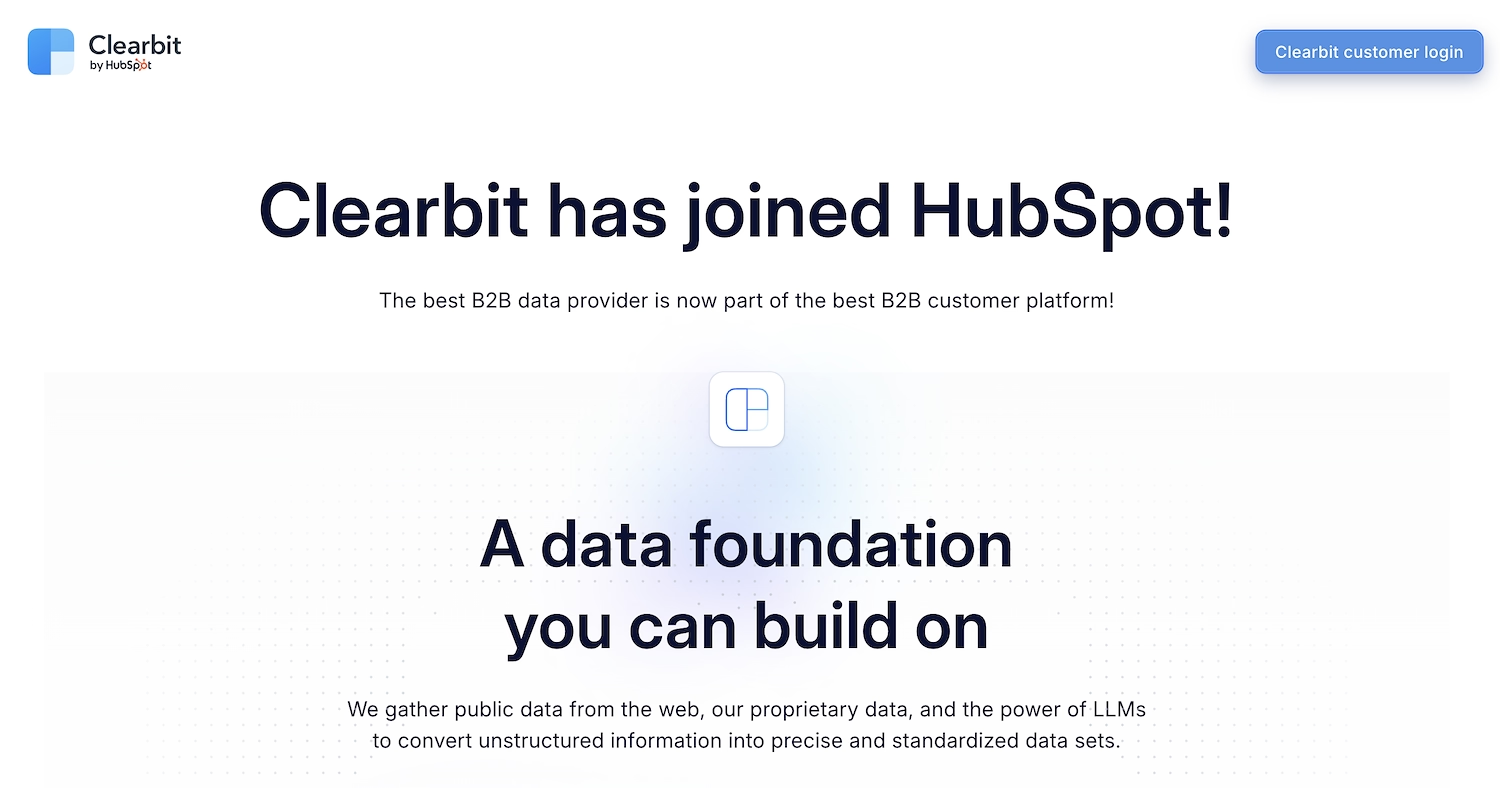
Clearbit is a marketing data engine that helps businesses identify ideal customers from website traffic. It turns anonymous visitors into qualified leads and provides data to build a complete customer profile for sales and marketing teams.
The platform enriches contact records with over 100 data points, such as company size and technology use. This information supports lead qualification and personalization efforts and integrates with common CRM tools.
Clearbit's Main Features
- Adds firmographic and demographic details to lead, contact, or account records by combining multiple data sources.
- De-anonymizes website traffic to identify visiting companies that match an ideal customer profile.
- Removes form fields that the system can enrich automatically to reduce friction and increase conversion.
- Provides data points like 6-digit NAICS codes and corporate hierarchy mapping for instant lead scoring and routing.
How Clearbit Compares to Openlead
Average Review Score: 4.4/5 stars based on 626 G2 reviews.
- Clearbit identifies anonymous website visitors and turns them into leads. This differs from Openlead, which primarily works with predefined prospect lists.
- It enriches contact records with over 100 data points, such as company size and technology use. This provides a more complete customer profile than the initial lists built with Openlead.
- The platform can shorten website forms by automatically filling in known information. This helps increase lead conversion rates, a feature not central to Openlead's list-building focus.
- This tool provides specific data like corporate hierarchy for instant lead scoring and routing. This offers a more advanced qualification process compared to Openlead's early-stage outreach management.
Where Openlead Might Be a Better Fit
- Clearbit's pricing can be high for teams that only need basic list-building tools. Openlead often provides a more accessible option for managing initial outreach without the cost of advanced data enrichment features.
- The platform's extensive data enrichment features can be more than what some teams require. In comparison, Openlead offers a more focused toolset for early-stage outreach, which can be simpler for teams to adopt quickly.
- Some users note that the implementation process for Clearbit can take time. Openlead, with its focus on specific outreach tasks, sometimes allows for a quicker setup and faster team adoption.
Pricing and Cost-Effectiveness
Neither Clearbit nor Openlead publishes its pricing, making a direct cost comparison unavailable. For an accurate quote based on your needs, we recommend visiting Clearbit's official website.
8) UpLead
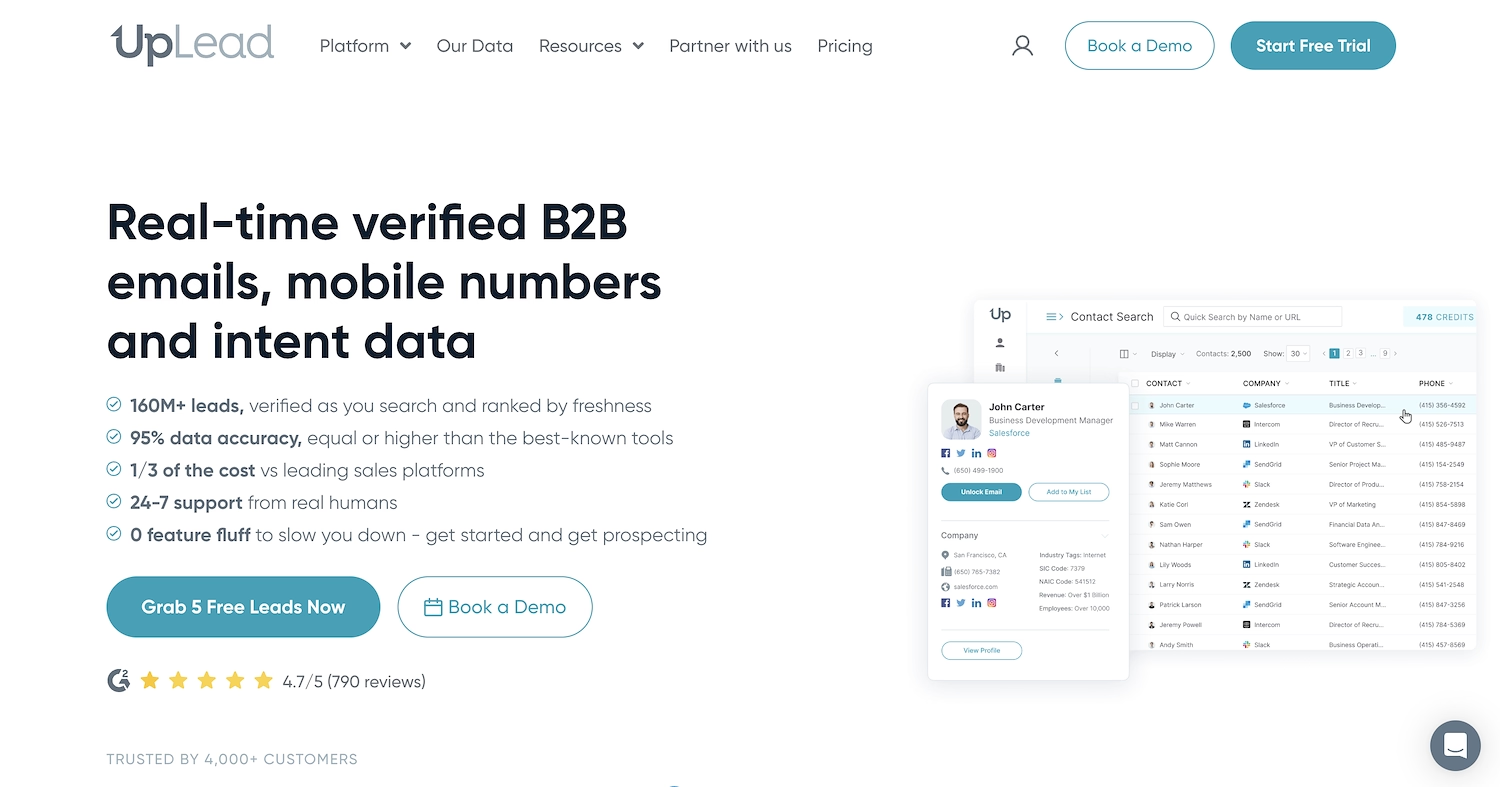
UpLead is a B2B lead generation platform that provides verified contact and company data. Sales teams use it to build accurate prospect lists with direct dials and mobile numbers, which helps them find and connect with new customers.
The platform offers real-time email verification to support data accuracy. It also provides data on technology use and buyer intent to help users identify qualified leads.
UpLead's Main Features
- The platform provides real-time email verification to ensure data accuracy.
- It offers over 50 search filters, including intent data, to find in-market buyers.
- The system provides data enrichment to clean and enhance contact and company records.
- It integrates with CRMs like Salesforce and HubSpot to automate workflows.
How UpLead Compares to Openlead
Average Review Score: 4.7/5 stars based on 797 G2 reviews.
- UpLead provides real-time email verification, which ensures data is accurate at the moment of search. This is different from Openlead, where lists might not have this immediate accuracy check.
- The platform offers over 50 search filters, including intent data, to find specific buyers. This allows for more targeted prospecting than the general list-building tools in Openlead.
- It includes data enrichment to clean and add details to existing contact records. This helps maintain a healthier database compared to the initial list creation focus of Openlead.
- This tool integrates directly with CRMs like Salesforce and HubSpot. This automates the workflow of moving prospect data, a step that is often manual with Openlead.
Where Openlead Might Be a Better Fit
- UpLead offers many features, such as over 50 search filters, which can be complex for teams with simple needs. In comparison, Openlead provides a more focused toolset for early-stage outreach that some teams may find easier to adopt.
- Some users report that UpLead's database sometimes contains outdated contact information. This may require manual verification, a step that can be less frequent with Openlead's focus on initial, more curated prospect lists.
- The tool's pricing plans might be a considerable investment for teams that only need basic list-building tools. Openlead can be a more accessible option to manage initial outreach without the cost of advanced features like intent data.
Pricing and Cost-Effectiveness
UpLead offers several pricing tiers, including a free trial, an Essentials plan at $99 per month, and a Plus plan at $199. Since Openlead does not publish its pricing, a direct cost comparison is unavailable, but UpLead's tiered model offers clear scalability.
9) Snov.io
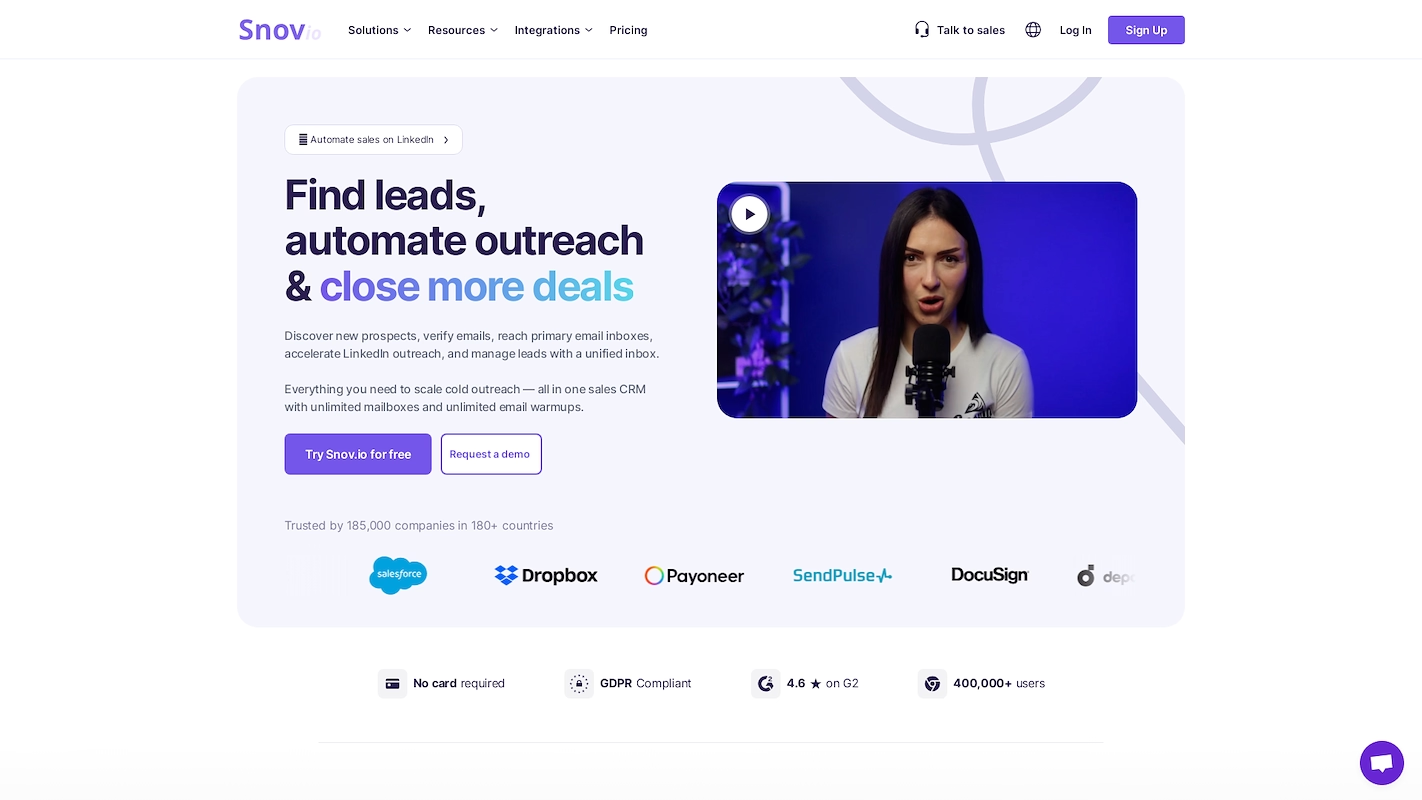
Snov.io is a sales automation platform for lead generation and outreach. It offers an email finder and verifier, plus tools to build automated drip campaigns. Sales and marketing teams use the platform to find contacts, engage prospects, and manage their outreach process from a single place.
Snov.io's Main Features
- The platform provides sales force automation to handle various sales tasks and activities.
- It includes lead management tools for tracking prospects and managing the sales pipeline.
- The system offers marketing automation capabilities to manage outreach and engagement campaigns.
- It features reporting and analytics with dashboards to monitor sales performance and data.
How Snov.io Compares to Openlead
Average Review Score: 4.6/5 stars based on 450 G2 reviews.
- Snov.io provides sales force automation to manage various sales activities, which is different from Openlead's focus on tools for early-stage outreach.
- The platform includes lead and opportunity management to track prospects through the sales pipeline. This offers a more complete view than the initial list-building functions in Openlead.
- It features reporting and analytics dashboards to monitor sales performance. This provides data insights that are not a central part of Openlead's outreach management tools.
- This tool combines lead generation, email verification, and outreach campaigns in one system. This is a more integrated approach compared to using Openlead for specific parts of the sales process.
Where Openlead Might Be a Better Fit
- Snov.io's extensive features sometimes create a learning curve for new users. In comparison, Openlead offers a more direct user experience that teams can adopt quickly for initial tasks.
- Some users report that managing emails within the all-in-one system can be complex. Openlead, with its focus on early-stage outreach, may provide a more straightforward process for specific email tasks.
- The tool's database sometimes contains missing or outdated information. This may require extra verification, a step that can be less frequent with Openlead's focus on building initial prospect lists.
Pricing and Cost-Effectiveness
Snov.io offers several pricing tiers, including a Starter plan at $39 per month and a Pro plan at $99. Since Openlead does not publish its pricing, a direct cost comparison is unavailable, but Snov.io's tiered model provides clear scalability.
10) RocketReach
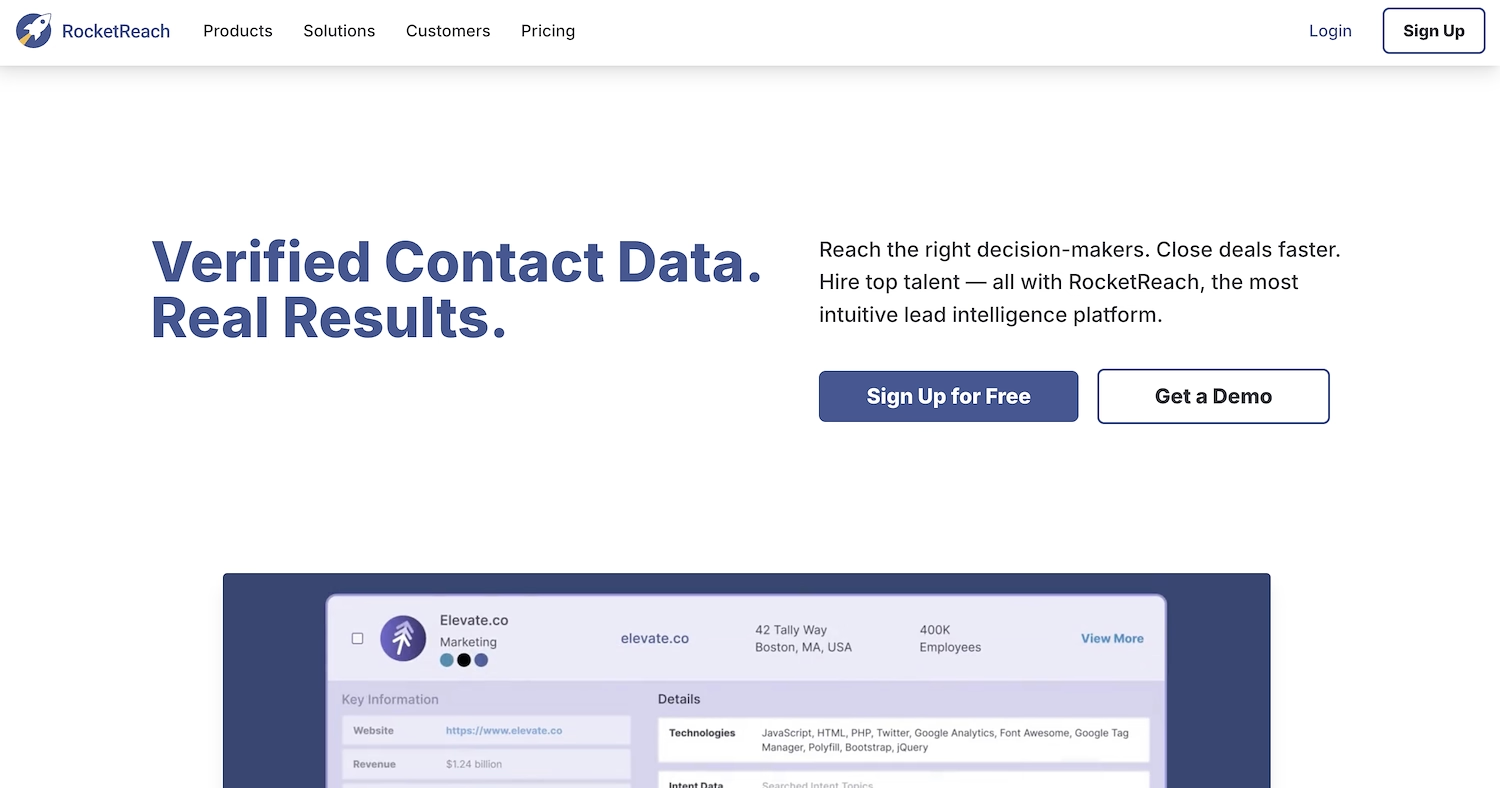
RocketReach is a service to find professional contact information. It gives users access to a large database of emails and phone numbers for individuals across many industries.
Sales, marketing, and recruiting teams use the platform to build prospect lists and connect with decision-makers. The tool supports outreach efforts with its data on companies and their employees.
RocketReach's Main Features
- The platform provides access to a database of over 700 million professionals and 35 million companies worldwide.
- It offers advanced search capabilities, bulk lookups, and browser extensions for Chrome and Edge.
- The system includes an API and prebuilt integrations for tools like Salesforce, HubSpot, and Zapier.
- It provides data cleaning and enrichment to maintain and enhance contact and company records.
How RocketReach Compares to Openlead
Average Review Score: 4.4/5 stars based on 918 G2 reviews.
- RocketReach provides access to a database of over 700 million professionals, which offers a larger pool for prospecting compared to the more focused lists in Openlead.
- It includes an API and prebuilt integrations for tools like Salesforce, allowing for a more connected workflow than the manual data transfers often needed with Openlead.
- The platform's advanced search and browser extensions offer more flexibility in finding contacts compared to the standard list-building functions in Openlead.
- With its data cleaning and enrichment features, the tool helps keep contact records current, a function not specified in Openlead's initial list-building process.
Where Openlead Might Be a Better Fit
- The platform's extensive features can be complex for teams that only need basic list-building. Openlead provides a more focused toolset for early-stage outreach, which some teams may find easier to adopt.
- Some users report its large database sometimes contains outdated information, which requires manual verification. This step can be less frequent with Openlead's more focused prospect lists.
- Its pricing model, based on lookups, can be costly for teams with high-volume needs. Openlead may be a more accessible option for teams that only require basic lead generation tools.
Pricing and Cost-Effectiveness
RocketReach offers several pricing tiers, including a free plan, an Essentials plan at $99 per month, and a Pro plan at $165. Since Openlead does not publish its pricing, a direct cost comparison is unavailable, but RocketReach's lookup-based model provides clear scalability.
Which One Should You Go With?
Choosing the right Openlead alternative depends on many variables specific to your business needs. This guide has provided several options to help you make an informed decision.
For teams looking to add digital workers to their sales process, 11x is a relevant option. The platform provides autonomous agents to handle various sales tasks. If automating your workflow is a priority, consider exploring what 11x can do for your team.




